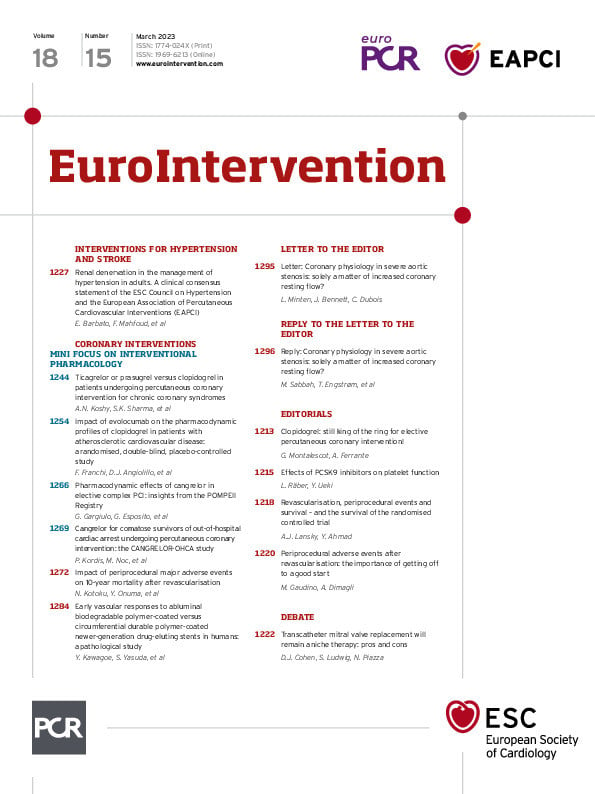Consequently, strategies have been considered to prevent these complications, including the off-label use of more potent P2Y12 inhibitors. Prasugrel and ticagrelor have indeed demonstrated a higher level and a faster onset of platelet inhibition, leading to an improvement in clinical outcomes of acute coronary syndrome (ACS), suggesting that their use may also be useful in CCS patients undergoing PCI. Both received a class IIb recommendation in specific high-risk situations of elective PCI, despite the lack of evidence1. In addition, this uncertain ischaemic risk reduction may come at the cost of a higher bleeding risk. In the ALPHEUS (The Assessment of Loading With the P2Y12 Inhibitor Ticagrelor or Clopidogrel to Halt Ischemic Events in Patients Undergoing Elective Coronary Stenting) trial, by far the largest randomised controlled trial (RCT) in the field, there was no difference in periprocedural ischaemic events nor in major bleeding at 30 days, but there was an increase in minor bleeding with ticagrelor compared to clopidogrel4. Other RCTs, all too small or stopped prematurely, as well as other meta-analyses, were consistent with the ALPHEUS results567.
In this issue of EuroIntervention, Koshy et al present a large single-centre retrospective cohort study of 11,508 patients undergoing PCI for CCS and discharged on clopidogrel (n=8,648) or ticagrelor/prasugrel (n=2,860) in addition to aspirin, according to the physicians’ choice8. Using a propensity score analysis, the authors found no difference in the primary endpoint of death or MI at 1 year (adjusted hazard ratio [adjHR] 0.86, 95% confidence interval [CI]: 0.62-1.17; p=0.33), including patients with complex PCI, and no difference in bleeding (adjHR 0.75, 95% CI: 0.46-1.21; p=0.23), confirming the findings from the previous RCTs. The maintenance dose was 75 mg (not 150 mg) for clopidogrel and 5 mg (not 10 mg) for prasugrel but 90 mg bid for ticagrelor. This reflects local practice like the choice of the drug itself for each patient. The non-significant trends must not be overinterpreted as they go in the same direction for ischaemic and bleeding events, suggesting a predominant influence of the patients’ profile more than the type of drug used. Indeed, the older and more comorbid patients received clopidogrel, and the propensity score cannot adjust for many frailty variables not included in the database. The angiographic high-risk characteristics in this study, which were the same as those in the randomised ALPHEUS trial, do not seem to play a major role in further clinical outcomes. This study somewhat confirms the disconnect that we have seen elsewhere between an attractive pharmacology of ticagrelor and prasugrel and the absence of clinical benefit in stable patients undergoing PCI. Predicting PCI complications remains challenging. What this study does not address is the frequency and effect of crossover from one drug to the other, the adherence to the different drugs, the duration and de-escalation strategies of dual antiplatelet therapy. Nevertheless, this real-world practice information is important, confirming the findings of the RCTs and the European recommendations.
The lack of benefit of potent platelet inhibition in CCS, as opposed to ACS, suggests that the outcome following PCI may be related more to the procedure itself in CCS and to the extent of the disease in ACS. So far, in the ring of elective PCI, clopidogrel remains the king and the others the challengers.
Conflict of interest statement
The authors have no conflicts of interest to declare.

